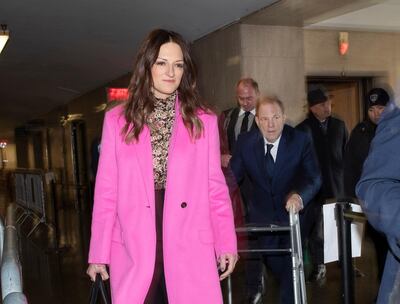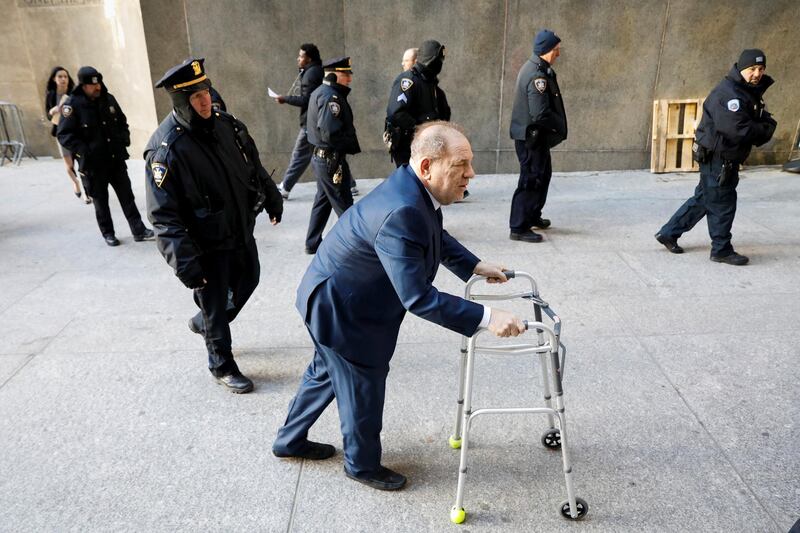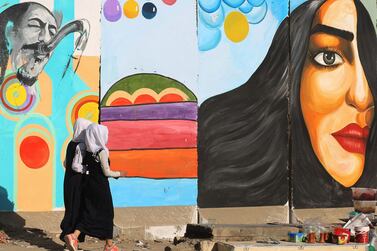The American public cannot get enough of the chronicles of Harvey Weinstein. The once powerful film producer with over 80 Oscars to his name is currently facing accusations of sexual misconduct by more than 80 women and has been charged with rape and sexual assault. A fallen man though he might be, having gone from Hollywood royalty to pariah since accusations began coming to light in 2017, there was only one story that grabbed as much attention this week as the killing of Iranian commander Qassem Suleimani in Baghdad by a US drone strike, and that was Weinstein's trial.
Just as America was waking up to the news of Suleimani, Weinstein was hit with new sexual assault charges in Los Angeles from two women. One woman claimed he raped her, another said he forced his way into her hotel room and dragged her by the hair to the bathroom.
In the intervening days, news of the Iranian ballistic missiles that rained down on US military facilities in response to Suleimani's killing vied for space with the #MeToo protests staged outside a New York city courtroom that Weinstein limped into, bent forward on a walker for support, to face sexual assault charges.
There is no doubt that Weinstein's reckoning has opened up a new era – that of the #MeToo campaign – and this will ensure that powerful men cannot get away by using their position to prey on the vulnerable. Even as prosecutors are trying to establish patterns in his behaviour that suggest he might be a predatory male, Weinstein is claiming that he was simply having consensual sex with every one of those women. Yet not one actor has stood up to vouch for his character. Over time, he has been painted as an odious and terrifying bully who deserves to go down. And what seems very likely at this point is that he will pay for allegedly destroying the lives of many while he was virtually running Hollywood.
But while Weinstein and his ilk might deserve what is coming to them, it is also important to remember that there is a darker side to the #MeToo campaign, one that is not popular to point out: sexual harassment allegations can be as subjective as they are serious. It is, of course, important that women who felt powerless are having their say but it has opened the door for some women – and also men – who have an axe to grind to accuse others of misconduct without any proof. False accusations can be career-ending. Recently, with Weinstein again in the news, other stories have come on the back of the producer's trial.

One young male editor in a premier New York publishing house told me his tale about dating a female colleague whom he later rejected, not wanting a serious relationship. Spurned, she went to the company's human resources department and filed a sexual misconduct case against him. The male editor was dismissed despite his protests and assertions of innocence while the woman got promoted.
Another story was that of a journalist bent on going after powerful men in an international government organisation by trying to find a ring of predatory abusers. She found no substantial proof. Yet she specifically targeted those men she considered to be “womanisers” without making the important distinction between rapists and men who woo women. Neither is appetising of course, but while one is illegal, the other is not. The journalist nonetheless succeeded in blackening the name of several powerful officials before eventually giving up her campaign for lack of evidence.
This question of how to interpret an inappropriate remark has come into sharp focus here in the US, where political correctness and "woke-ism" – which refers to a perceived awareness of issues concerning social and racial justice – have made it imperative to censor one’s speech before saying anything. Is this good or bad? We are more aware, yes. But we are also muffled with fear of being inappropriate.

The global reckoning on the abuse of power is extraordinary – and it is empowering. Women will no longer put up with being victims. But my worry is that this can be abused. My other concern is that so many men have now been rendered pariah. Can, and should, figures like actor-director Woody Allen – alleged to have molested his adopted daughter – be forgiven? I am not sure I can ever watch a Kevin Spacey film again. But should we bring people like him back into society?
Here in America, we are going through a massive societal change akin to what happened to this country in the 1960s, at the height of the anti-Vietnam war movement, the sexual revolution and the birth of civil rights.
It was a heady time that changed mores and values across the country, shaped a new generation of feminists and altered forever the balance between men and women. The trial of Weinstein will echo that era and re-balance the equation between men and women, not just in Hollywood but in every small town in America.
Janine di Giovanni is a senior fellow at Yale University’s Jackson Institute for Global Affairs and the author of The Morning They Came for Us: Dispatches from Syria






